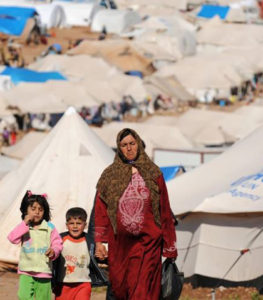Syrian refugees in Lebanon falling into debt traps
Syrian refugees exiled in Lebanon are falling deeper into personal debt, the United Nations refugee agency UNHCR has reported recently, with some families even marrying off children to cope  financially.
financially.
The past year has seen the financial situations of Syrians in Lebanon worsen with a study showing that the average household debt has increased in the last three years from $800 in 2016 to more than $1,000 in 2018.
The study, by (UNHCR, the World Food Program (WFP) and the UN children’s fund (UNICEF) paints a dire picture of life for Syrian refugees languishing in neighboring Lebanon.
The Syrian conflict erupted in 2011 generating 5.6 million refugees in the Middle East, with Lebanon hosting more than 950,000 registered refugees, according to UNHCR.
With families struggling to afford food, rent and medicine, child marriage is also on the rise the study said.
Twenty-nine percent of Syrian girls aged between 15 and 19 are married in Lebanon, a number that has been growing, according to the report.
“These findings are a reminder to all of us that the situation for children is becoming more delicate,” said a UNICEF statement.
“We are seeing refugee families resorting to behaviors that put their children at increasing harmful risks,” the statement said.
Around 69 percent of Syrian refugee families in Lebanon are living below the poverty line and nearly eight out of 10 Syrian kids aged 3 to 5 and 15 to 17 are not in school.
Many children are forced to work, as they cannot afford transportation or lack the supplies they need to go to school.
The proportion of Syrian child refugees working in Lebanon has risen to 7 percent from 4 percent in late 2016, according to research by the Danish Refugee Council.
Shelter conditions have also worsened among Syrian households, and 34 percent now live in non-residential or non-permanent accommodation.
The proportion of Syrian child refugees working in Lebanon has risen to 7 percent from 4 percent in late 2016, according to research by the Danish Refugee Council (DRC).
Shelter conditions have also worsened among Syrian households, and 34 percent now live in non-residential or non-permanent structures, an increase from 26 percent in 2017 according to the report.
“The study is a poignant reminder of the daily hurdles refugees have to go through just in order to survive,” a UNHCR statement said.
Syrians in Lebanon cannot work legally and have little access to public services. They are vulnerable to exploitation by unscrupulous employers in the black economy.
Laurie Nowell
AMES Australia Senior Journalist












